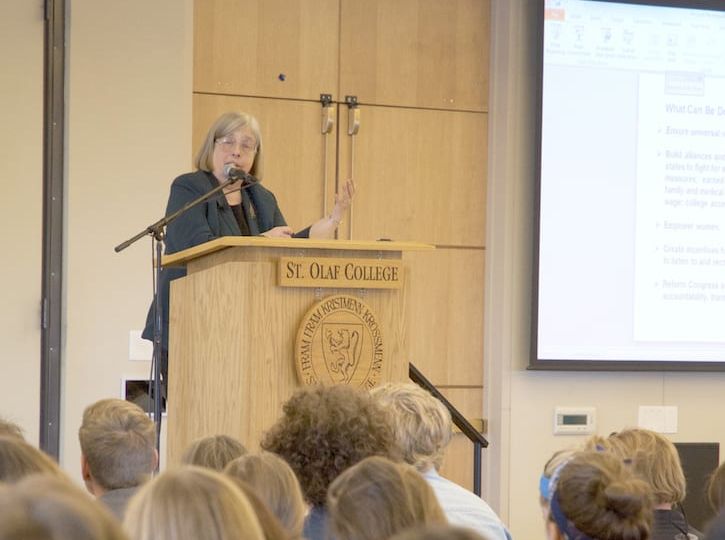
Multiple prominent thinkers in the fields of political science and economics descended upon Northfield on Feb. 20 and 21, as part of the 2015 St. Olaf Social Science Conference. The Conference featured Professor Casey Mulligan from The University of Chicago, Professor Steven Fazzari from Washington University in St. Louis and Theda Skocpol from Harvard University.
The conference was funded by several sources, including the newly-created Institute for Freedom and Community. Despite concerns over the use of “freedom” in the name, which some believe conveys a right-wing bias, the conference was able to attract self-professed liberals like Skocpol.
The main goal of the Social Science Conference this year was to address the existence and ramifications of income inequality in all facets of the social sciences. The invited professors represented different fields; Mulligan and Fazzari are professors of economics, while Skocpol is a professor of political science. Together, they offered a multidisciplinary analysis of the complex issue.
The growing divide between rich and poor is an important topic that has been the subject countless documentaries, books and hours of expert analysis in the past few years. Each of the speakers latched onto a specific aspect of the economic inequality issue that they intended to discuss and address.
Professor Hofrenning, Associate Dean of the Social Sciences at St. Olaf, spoke about the choice of topic for this year’s conference.
“In recent years, we have focused on healthcare, immigration, human rights and families. This year the normal sources of funding were supplemented with new support from the new public affairs program, the Institute for Freedom and Community,” Hofrenning said.
Skocpol, the most well-known of the three speakers, divided America’s economic history in terms of economic inequality into two segments.
“If you look at [income growth] between the end of World War II and 1979, that’s the cutoff I prefer, although you can quibble. A rising tide was raising all boats… since 1979 there’s been volatile but extreme upward growth only for the 1%,” Skocpol said.
The income inequality growth has been so significant since the 1970s that Skocpol has utilized her fellow professionals’ allegorical countries to repepresent this growing divide.
“My colleagues Jacob Hacker and Paul Pierson call the early world Broadistan… shared prosperity and then we moved into [Richistan], a new world where the top is pulling away,” Skocpol said.
After the keynote lecture of each speaker, the audience was given the chance to ask questions of the speakers. The debate and discussion were not purely limited to students, though; plenty of faculty members and other adults were able to submit questions.
The speakers themselves questioned each others claims. Skocpol and Mulligan sparred over the controversial implementation and economic effects of Obamacare. Mulligan opposes the ACA while Skocpol believed it to be a “step in the right direction” for the combat of income inequality.
A student panel, moderated by Erik Springer ’15 and SGA President Rachel Palermo, discussed economic inequality on Saturday afternoon. Many of these students were double majors, straddling multiple disciplines of the social sciences. The lenses of economics, political science, sociology, anthropology and social work were used to discuss economic inequality. This panel was part of the initiative to allow students to engage with the issues facing the public today.
The speakers and students not only discussed the cause and ramifications of economic inequality but also possible economic and political solutions to these problems.
johnso16@stolaf.edu
Photo Credit: KATELYN REGENSCHEID/MANITOU MESSENGER

